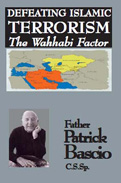
 |
Bascio's focus throughout this book is two-fold. He points the American reader to events in Central Asian countries, such as Uzbekistan, where the Wahhabi brand of Islam is relatively contained. Although gaining young, unemployed followers, those with education reject it. And he challenges America to learn from the CA countries and find ways to address the Islamic extremist threat. Next the author warns about Saudi-funded mosques and trained imams in America that since the 1980s have been teaching Wahhabism.
What is Wahhabism? Who does it appeal to? Why has Saudi Arabia spent $87 billion since 1973 to promote it in America? Why don't we hear about this? This 256-page book presents answers for these significant questions. Wahhabi is a sect of Islam that teaches youth it is their duty to carry out jihad (i.e. holy war) against infidels (i.e. Jews, the West, etc.). Osama Bin Laden used Wahhabi tactics. The Taliban's Sharia law in Afghanistan represented the ideal form of Wahhabi government. Wahhabism attracts youth from mosques or prison, and forms them into small and secretive cells. Always Muslim first, our Saudi ally desires to promote Islam in America. Taking advantage of the lack of mosques, the Saudis built their own and installed Wahhabi-trained imams. Indoctrination is tolerated by the United States government due to oil alliances.
Bascio's extensive knowledge of the subject demonstrates both the author's gift for research and his strong concern about the consequences of American policy. Unfortunately, the book was last published in 2007; the author passed away in 2010. Chapters 6 and 8 need updating regarding the fate of key figures. Chapter 17 mentions an attempt in 2005 to form a Caliphate by the Party of Islamic Liberation, years prior to the current ambitions of ISIS to the Caliphate. Still, Bascio's insights, such as why Saddam Hussein disliked Wahhabism, along with detailed information regarding the history and goals of that sect remain timely, maybe more so with events occurring in Middle East and Africa sponsored by Wahhabi Islamic extremists ISIS and Boko Haram.
RECOMMENDED by the US Review